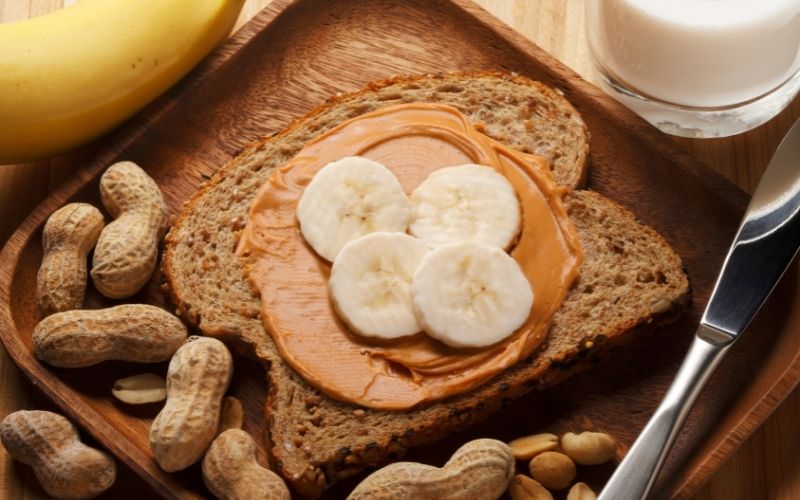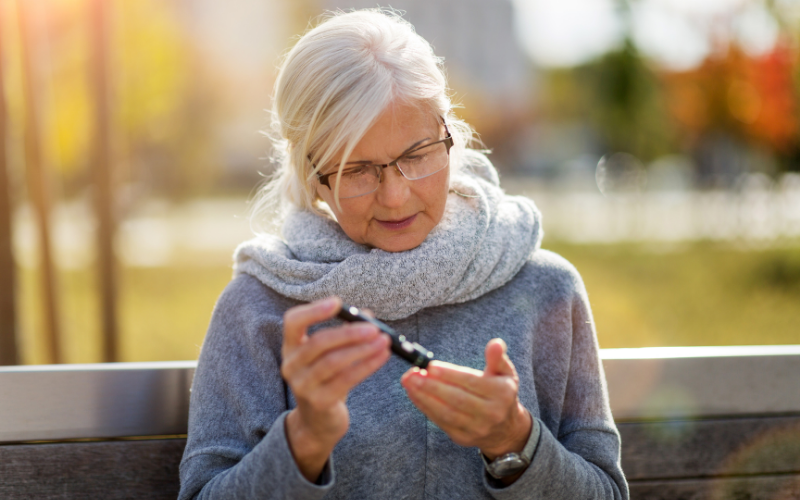7 Midnight Snacks That RDs Say Can Help Lull You Back To Sleep
Original Post | Well + Good Food and Nutrition
We’ve all had those nights where we inexplicably wake up in the middle of the night with a grumbling belly. Maybe it was that HIIT workout you braved for the first time, your marathon of meetings-slash-evening-errands that left you with little time to eat an adequate dinner, or maybe you were just dreaming about delicious pasta (the best type of reverie).

While you could certainly go forth and eat gobs of Nutella straight from the jar—convenience and tastiness are both extremely key, after all—you don’t need to be an registered dietitian to conclude that the sugar content isn’t exactly a recipe for sound sleep the rest of the night. “High fat and high sugar foods like ice cream and cookies are a double whammy of not helping you sleep well, because fat takes a long time to digest,” says Dawn Blatner, RDN, author of The Superfood Swap. “Giving your gut foods that are difficult to digest distracts your body from sleep, and then sugar causes spikes and crashes of blood sugar and those will interrupt sleep, too.”
Blatner also suggests avoiding alcohol since, even though your nightcap can make you feel sleepy, it will disrupt your sleep cycle later in the night and lead to lower quality sleep. Caffeinated teas or too much of anything liquid should also be consumed in moderation, she adds, as having to use the bathroom can keep you awake.
So what should you eat if you’re in the mood for a mid-snooze nosh? Read on for these RD-approved suggestions for healthy midnight snacks that will help you get right back to your REM cycle.
7 healthy midnight snacks that will help lull you back to sleep
1. Tart Cherries
“Tart cherries are a natural source of melatonin, a hormone that regulates the body’s internal clock and sleep-wake cycle,” says Blatner. If you can’t find tart cherries at the supermarket, she suggests opting for tart cherry concentrate, which is the super-charged version of tart cherry juice with two tablespoons packing in the equivalent of a whopping 60-plus cherries. Instead of guzzling it (remember that sugar and excessive amounts of liquid can keep you awake), create yourself a little ‘natural’ jello shot before bed. “All you do is mix two tablespoons of tart cherry concentrate with a tablespoon of chia seeds and chill it in the fridge. Try topping it with greek yogurt to combat the tartness,” Blatner says.RELATED STORIES‘I’m a Registered Dietitian, and This Is the One Food I Always…Why Snacking on Hemp Seeds Can Help You Sleep More Soundly
2. Pumpkin Seeds
“Pumpkin seeds are an excellent source of magnesium, and studies have found that magnesium improves insomnia and sleep efficiency,” says Blatner. Almonds, cashews, and peanuts are other good sources of magnesium that all make for ideal healthy midnight snacks.
3. Cottage Cheese
Cottage cheese contains the amino acid L-tryptophan. “Tryptophan plays a role in the production of serotonin, a neurotransmitter that’s associated with healthy sleep,” says Blatner. “Research has found people who ate cottage cheese about 30 minutes to an hour before going to bed experienced better metabolic health, muscle quality, and overall health than people who didn’t.”https://79dbc014217aa09ddae4500b65493fc3.safeframe.googlesyndication.com/safeframe/1-0-38/html/container.html
We know it’s no cheesy mozzarella pizza or ricotta cheesecake, but you can optimize your enjoyment of cottage cheese with a sprinkle of cinnamon (which has its own sleep benefits). “You can also try topping it with tahini or sunflower seed butter, which both contain tryptophan as well,” says Blatner.
4. Warm Milk
“New research suggests that the casein protein in cow’s milk interacts with trypsin, a digestive enzyme in the stomach, to produce a sleep-enhancing peptide complex called CTH, or casein tryptic hydrolysate,” says Blatner. “The added vitamin D in milk may also play a role in maintaining healthful sleep.”
5. Kiwi
“Research suggests that the antioxidants and natural serotonin in kiwis can improve both sleep quality and quantity,” says Blatner. Kiwis are naturally sweet and delicious as-is, but you can jazz them up by lightly dipping them in dark chocolate. “Dark chocolate has magnesium, a helpful sleep mineral, but it also has a little caffeine, so go easy on it.”
6. Banana with Peanut Butter
“Foods that contain unsaturated fats, like peanut butter, can help improve serotonin levels and boost satiety to keep you feeling satisfied and full during sleep,” says Carissa Galloway, RDN, a nutrition consultant at Premier Protein. “Eating bananas with peanut butter can also be helpful before bed, as bananas contain magnesium which, as mentioned, help support good sleep.” The combination of bananas plus peanut butter makes for one of the most delicious healthy midnight snacks out there.
7. Chamomile Tea
“There are numerous studies that support the benefits of chamomile tea in promoting a healthy nighttime routine,” says Galloway. Chamomile tea contains flavonoids, which are compounds found in certain foods, including one called apigenin. “Apigenin connects with receptors in our brains to help reduce insomnia and promote a state of steady sleep.”
So when you find yourself wide awake in the wee hours, sip a cup of chamomile tea with a splash of steamed almond milk, or have a batch of Blatner’s chamomile cookies on hand.
All that said, bear in mind that more important than what you eat before bed, is the amount. “Having a large amount of any food will take too much effort for your body to digest instead of resting,” says Blatner. A light nosh of one of the foods recommended here, on the other hand, will send you right into the sweetest of dreams.





